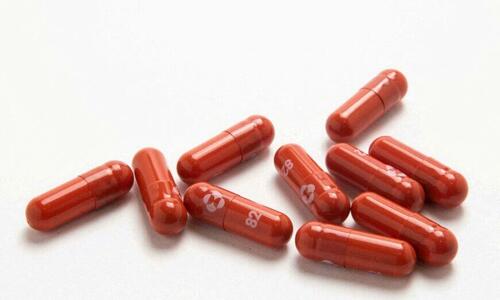Molnupiravir (Merck) is ineffective for reducing covid mortality. Meanwhile, it costs a lot….

The COVID-19 antiviral drug Molnupiravir helps speed recovery from the virus but does not reduce the rate of hospitalization or death in vaccinated adults at higher risk, according to a new study. The medicine, made by Ridgeback Biotherapeutics and Merck & Co. is used to treat mild to moderate COVID-19 and can be taken at home, twice a day for five days, within five days of the onset of symptoms. That's according to an academically reviewed study published in The Lancet on Dec. 22.
The drug is supposed to stop the virus from replicating and keeps its levels low in the body, reducing its severity.
Between 8 December 2021 and 27 April 2022, more than 25,700 eligible participants in the UK, aged 50 or over or 18 years with relevant co-morbidities, who had been ill with confirmed COVID-19 for five days or less , took part in the study, which was conducted when the Omicron variant was dominant.
Half of the participants were randomly assigned to receive an 800-milligram dose of molnupiravir twice daily for five days, and the other half were assigned to receive usual hospital care only.
The mean age of the participants was 56.6 years and 94% had received at least three doses of the SARS-CoV-2 vaccine.
The researchers conducted a follow-up of the participants via an online diary or a phone call within 28 days. They found that hospitalizations or deaths occurred in 105 (1%) of the 12,529 participants who received molnupiravir, compared with 98 hospitalizations or deaths (1%) recorded in the 12,525 participants who received usual care.
However, the study found that participants who received molnupiravir recovered more quickly than those who received their usual care, had a higher rate of early and long-lasting recovery, had a reduced viral load, and required a fewer consultations by general practitioners. Twenty per cent of patients treated with molnupiravir required a consultation with their family doctor compared with 24% of those receiving usual care, a minimal difference. In short, the drug is not completely ineffective, but only does not reduce mortality.
Participants who received molnupiravir reported a median recovery time of nine days compared with 15 days for those who received only their usual care, according to the study; the researchers said further analyzes suggested molnupiravir sped recovery by an average of 4.2 days.
“This analysis of the largest randomized trial involving people vaccinated against SARS-CoV-2 infection, at high risk of adverse community outcomes, and living with COVID-19, showed that the early addition of molnupiravir to care routines did not reduce hospital admissions or mortality (which were low in both treatment groups)," noted the study authors.
“However, participants in the molnupiravir plus usual care group recovered more quickly than those in the usual care group, had a higher rate of sustained early recovery, and had fewer primary care physician consultations,” they added.
In November 2021, Merck said results from the MOVe-OUT study of molnupiravir showed that the oral antiviral drug was 30 percent effective at reducing hospitalizations. However, the study was conducted in unvaccinated adults.
Soon after, the UK became the first country to approve molnupiravir for the treatment of mild to moderate COVID-19 in people with other risk factors, such as obesity, diabetes or over the age of 60.
The National Institute for Health and Care Excellence (NICE), which provides national guidance and advice to improve health and social care in the UK, has recommended that people stop using five treatments against COVID-19, including Merck's antiviral pill, to treat the virus, stating that "while there is some clinical evidence of their effectiveness in treating COVID-19, they have not been found to be cost effective". In short, it costs too much for the benefits it provides.
Chris Butler, professor of primary care in the Nuffield Department of Primary Care Health Sciences at the University of Oxford and co-lead investigator, told a Science Media Center briefing after the study was published that the findings indicate that molnupiravir could contribute to ease the burden on UK health services, which are under pressure, and could also be used to help key workers get back to work faster, as it helps speed recovery from COVID-19. But Richard Hobbs, Nuffield Professor of primary care at Oxford and co-investigator, pointed to the high price tag associated with the antiviral drug, which is estimated to cost several hundred pounds for a five-day course.
“Molnupiravir is a high-cost antiviral. Its deployment will depend on how much an average four-day symptom improvement is beneficial to the country,” Hobbs said at the briefing.
Molnupiravir earned Merck nearly $5 billion in sales in the drug's first year. From the point of view of profits, it has been found to be a very effective drug…

Thanks to our Telegram channel you can stay updated on the publication of new articles from Economic Scenarios.
The article Molnupiravir (Merck) is ineffective for reducing covid mortality. Meanwhile, it costs a lot…. comes from Economic Scenarios .
This is a machine translation of a post published on Scenari Economici at the URL https://scenarieconomici.it/il-molnupiravir-merck-e-inefficace-per-ridurre-la-mortalita-del-covid-intanto-costa-molto/ on Tue, 27 Dec 2022 17:53:33 +0000.
